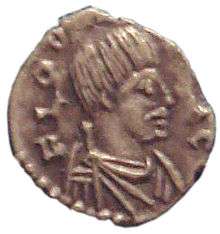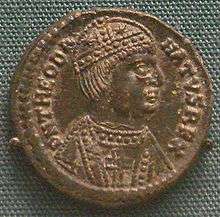Grimoald, King of the Lombards
Grimoald I (or Grimuald) (c. 610 – 671 CE) was duke of Benevento (647–662) and king of the Lombards (662–671).[1]
Grimoald was probably born before 610 to Duke Gisulf II of Friuli and the Bavarian princess Ramhilde, daughter of Duke Garibald I of Bavaria. He succeeded his brother Radoald in 646/7 as duke of Benevento.[2] In 641–42 CE, he and Radoald had served as regents for their mentally incapable adoptive brother, Duke Aiulf I.[2] Grimoald married the princess Theodota, daughter of King Aripert I. Their son was Garibald.
In 662, after being called to assist King Godepert in a war with his brother King Perctarit, Grimoald gave Benevento to his eldest son Romuald (662–677) and, removing the fraternal impediments to his kingship with the aid of Duke Garibald of Turin, assassinated Godepert and forced Perctarit to flee. He sent Perctarit's wife and son (Cunipert) to Benevento and took over the kingship of the Lombards. It was then that he promptly married Godepert's sister in order to relate himself to the Bavarian Dynasty of Theodelinda.
His martial prowess and skill in the field of battle secured his victory in many border wars. He led his armies to victory personally against the Byzantines under Emperor Constans II at the siege of Benevento, where they had been besieging the young Romuald, who betrothed his sister Gisa to Constans. Romuald then took Taranto and Brindisi, much limiting the Byzantine influence in the region during the rebellion of Mezezius in Sicily, which had distracted the Byzantines after Constans' death. Grimoald himself took Forlì, in the north, from the Greeks and razed Oderzo (but did not take it), where his brothers had been murdered years before. His capture of Forlì was shameful, however, for he took it on Easter Day, slaughtering worshippers during the festivities.
While he was combatting the Byzantines in the Mezzogiorno, he left Duke Lupus of Friuli as regent in the north. Lupus usurped all authority and rebelled, though he was crushed and, with the help of the Avars, his duchy despoiled and devastated. Grimoald tracked down Lupus' aspiring son Arnefrit, and his Slav allies, and defeated him at Nimis. Arnefrit died in battle. Grimoald placed Wechthari, a stalwart enemy of the Slavs, in Friuli.
Grimoald defeated the Franks, who invaded during the infancy of Chlothar III. Grimoald had allied with Perctarit at Asti and the Avars, of whom he had been a hostage in his youth. He saved the northeast of Italy by defeating the Slav tribes and maintained internal order by suppressing the baronial revolts and autonomy of the duchies of Friuli and of Spoleto, where he installed Thrasimund.
In his religion he remained Arian despite his marriage to a Catholic and he was aloof of the Papacy. However, he perceived Saint Michael — whose cult was spreading strongly from Monte Gargano— as the warrior-protector of the Lombard nation.
He died in 671 after concluding a treaty with the Franks and was succeeded by Perctarit, whom he had exiled. He was a popular ruler, known as much for the kingly virtues of generosity and mercy as for his ferocity and ruthlessness in war. His son Romuald was left in Benevento, which once again drifted away from central authority, and his son Garibald was not elected to succeed him on account of his youth and was deposed by the adherents of Perctarit's cause in three months time.
Notes
- ↑ Chris Wickham, Early Medieval Italy: Central Power and Local Society, 400–1000 (London: Macmillan, 1981), 224–25.
- 1 2 Andrea Bedina, "Grimoaldo, re dei Longobardi", Dizionario Biografico degli Italiani, 59 (Rome: Istituto dell'Enciclopedia Italiana, 2003).
Sources
- Gwatkin, H. M., Whitney, J. P. (ed) The Cambridge Medieval History: Volume II—The Rise of the Saracens and the Foundations of the Western Empire. Cambridge University Press, 1926.
- Oman, Charles. The Dark Ages 476-918. London, 1914.
| Regnal titles | ||
|---|---|---|
| Preceded by Radoald |
Duke of Benevento 651–662 |
Succeeded by Romoald I |
| Preceded by Godepert |
King of the Lombards 662–671 |
Succeeded by Garibald |
| Preceded by Perctarit | ||
| ||||||||||||||||||||||||||||
|


